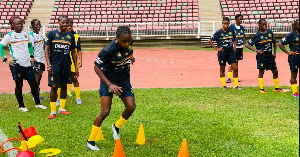Senegal has closed its border with Guinea because of the Ebola outbreak in West Africa, despite warnings that such measures are counterproductive.
Senegal also banned flights and ships from Guinea, Liberia and Sierra Leone - the three worst-hit countries.
The World Health Organization (WHO) says travel bans do not work, especially if they stop doctors going to help tackle the crisis.
In Liberia, a boy shot while protesting about a quarantine has reportedly died.
Shakie Kamara, 16, was one of three people seriously injured on Wednesday after security forces fired at protesters, angry after blockades were erected around the West Point slum.
His grandmother tearfully told local TV that she had seen his body in hospital.
The quarantine was imposed on West Point after local residents stormed a quarantine centre last weekend, looting it and allowing 17 suspected Ebola patients to leave, leading to fears the virus could spread through the area.
Residents said they were unable to leave the area to work or buy food but the government says supplies are being distributed.
The current outbreak of Ebola is the most deadly ever, killing at least 1,350 people.
In Nigeria, the health minister has announced two new cases of Ebola - spouses of people already infected. Five of Nigeria's 14 cases have died, while another five have recovered and been discharged.
David Nabarro, a British doctor who the United Nations appointed last week to co-ordinate the global response to the crisis, told the AFP news agency he did not know what stage the current outbreak was at.
"We're either close to a plateau, but then we'll drop, or we're in a phase - an inflexion point - where it is going to increase, and I absolutely cannot tell," he said in Guinea before travelling to Liberia.
Fruit bats are believed to be a major carrier of the Ebola virus but do not show symptoms
Symptoms include high fever, bleeding and central nervous system damage
Fatality rate can reach 90% - but current outbreak has mortality rate of about 55%
Incubation period is two to 21 days
There is no vaccine or cure
Supportive care such as rehydrating patients who have diarrhoea and vomiting can help recovery
Fruit bats, a delicacy for some West Africans, are considered to be virus's natural host
Senegal's capital, Dakar, is a regional hub for West Africa.
It is likely that many doctors and medical supplies arriving from Europe or the US would pass through there before going to the affected countries.
On Thursday, South Africa banned citizens of the three countries from entering its territory and banned non-essential outgoing travel to them.
WHO spokesman Gregory Hartl told the BBC's Newsday programme that the borders of the affected countries were porous, so any ban would be "impossible to enforce".
"All you end up doing is restricting the kind of legitimate travel which is needed in order to continue to help these countries beat the Ebola outbreak," he said.
Mr Hartl said what was needed was more doctors and officials to help trace those infected with Ebola, and more mobile laboratories.
On Thursday, a Russian transport plane carrying a mobile lab and team of specialist medics such as virologists and epidemiologists flew to Guinea's capital Conakry.
The lab can test more than 100 samples daily.
Mr Hartl also said that a deadly fever which has killed at least 13 people in the Democratic Republic of Congo was not Ebola, saying it was febrile gastro-enteritis.
Senegal first closed its border with Guinea in March when the outbreak started.
It was reopened in May after the situation in Guinea seemed to have stabilised but there has been a recent increase in the number of cases in the country.
Cameroon, Ivory Coast and Kenya have also imposed travel bans.
The WHO says the risk of spreading Ebola through air travel is low as sick people are unlikely to travel.
However, this is how the virus was spread from Liberia to Nigeria.
Ebola has no known cure but some affected people have recovered after being given an experimental drug, ZMapp, however, supplies are now exhausted.
On Thursday, two US doctors were discharged from hospital after being given the drug, while three Liberian medics are also recovering well.
Some strains of the virus can kill up to 90% of those infected but in the current outbreak, the fatality rate is about 55%.
It is spread through bodily fluids.
Infos Santé of Friday, 22 August 2014
Source: bbc.com













